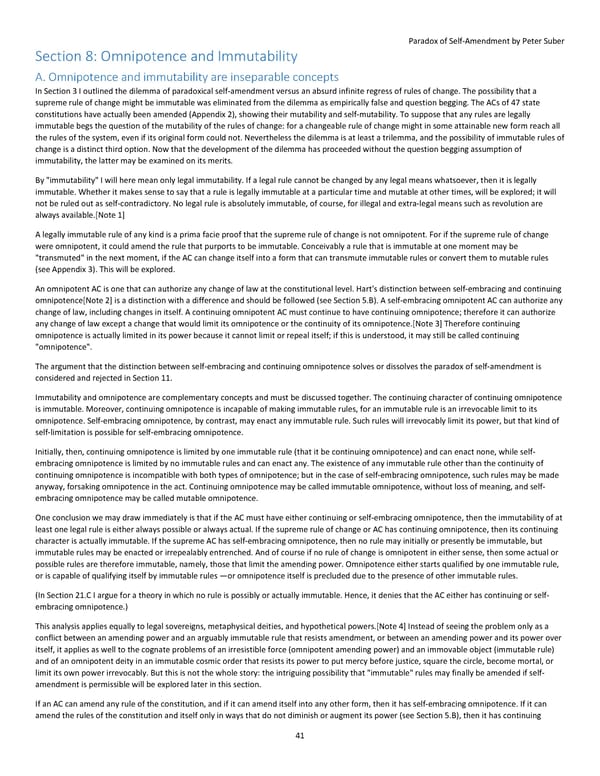Paradox of Self-Amendment by Peter Suber Section 8: Omnipotence and Immutability A. Omnipotence and immutability are inseparable concepts In Section 3 I outlined the dilemma of paradoxical self-amendment versus an absurd infinite regress of rules of change. The possibility that a supreme rule of change might be immutable was eliminated from the dilemma as empirically false and question begging. The ACs of 47 state constitutions have actually been amended (Appendix 2), showing their mutability and self-mutability. To suppose that any rules are legally immutable begs the question of the mutability of the rules of change: for a changeable rule of change might in some attainable new form reach all the rules of the system, even if its original form could not. Nevertheless the dilemma is at least a trilemma, and the possibility of immutable rules of change is a distinct third option. Now that the development of the dilemma has proceeded without the question begging assumption of immutability, the latter may be examined on its merits. By "immutability" I will here mean only legal immutability. If a legal rule cannot be changed by any legal means whatsoever, then it is legally immutable. Whether it makes sense to say that a rule is legally immutable at a particular time and mutable at other times, will be explored; it will not be ruled out as self-contradictory. No legal rule is absolutely immutable, of course, for illegal and extra-legal means such as revolution are always available.[Note 1] A legally immutable rule of any kind is a prima facie proof that the supreme rule of change is not omnipotent. For if the supreme rule of change were omnipotent, it could amend the rule that purports to be immutable. Conceivably a rule that is immutable at one moment may be "transmuted" in the next moment, if the AC can change itself into a form that can transmute immutable rules or convert them to mutable rules (see Appendix 3). This will be explored. An omnipotent AC is one that can authorize any change of law at the constitutional level. Hart's distinction between self-embracing and continuing omnipotence[Note 2] is a distinction with a difference and should be followed (see Section 5.B). A self-embracing omnipotent AC can authorize any change of law, including changes in itself. A continuing omnipotent AC must continue to have continuing omnipotence; therefore it can authorize any change of law except a change that would limit its omnipotence or the continuity of its omnipotence.[Note 3] Therefore continuing omnipotence is actually limited in its power because it cannot limit or repeal itself; if this is understood, it may still be called continuing "omnipotence". The argument that the distinction between self-embracing and continuing omnipotence solves or dissolves the paradox of self-amendment is considered and rejected in Section 11. Immutability and omnipotence are complementary concepts and must be discussed together. The continuing character of continuing omnipotence is immutable. Moreover, continuing omnipotence is incapable of making immutable rules, for an immutable rule is an irrevocable limit to its omnipotence. Self-embracing omnipotence, by contrast, may enact any immutable rule. Such rules will irrevocably limit its power, but that kind of self-limitation is possible for self-embracing omnipotence. Initially, then, continuing omnipotence is limited by one immutable rule (that it be continuing omnipotence) and can enact none, while self- embracing omnipotence is limited by no immutable rules and can enact any. The existence of any immutable rule other than the continuity of continuing omnipotence is incompatible with both types of omnipotence; but in the case of self-embracing omnipotence, such rules may be made anyway, forsaking omnipotence in the act. Continuing omnipotence may be called immutable omnipotence, without loss of meaning, and self- embracing omnipotence may be called mutable omnipotence. One conclusion we may draw immediately is that if the AC must have either continuing or self-embracing omnipotence, then the immutability of at least one legal rule is either always possible or always actual. If the supreme rule of change or AC has continuing omnipotence, then its continuing character is actually immutable. If the supreme AC has self-embracing omnipotence, then no rule may initially or presently be immutable, but immutable rules may be enacted or irrepealably entrenched. And of course if no rule of change is omnipotent in either sense, then some actual or possible rules are therefore immutable, namely, those that limit the amending power. Omnipotence either starts qualified by one immutable rule, or is capable of qualifying itself by immutable rules —or omnipotence itself is precluded due to the presence of other immutable rules. (In Section 21.C I argue for a theory in which no rule is possibly or actually immutable. Hence, it denies that the AC either has continuing or self- embracing omnipotence.) This analysis applies equally to legal sovereigns, metaphysical deities, and hypothetical powers.[Note 4] Instead of seeing the problem only as a conflict between an amending power and an arguably immutable rule that resists amendment, or between an amending power and its power over itself, it applies as well to the cognate problems of an irresistible force (omnipotent amending power) and an immovable object (immutable rule) and of an omnipotent deity in an immutable cosmic order that resists its power to put mercy before justice, square the circle, become mortal, or limit its own power irrevocably. But this is not the whole story: the intriguing possibility that "immutable" rules may finally be amended if self- amendment is permissible will be explored later in this section. If an AC can amend any rule of the constitution, and if it can amend itself into any other form, then it has self-embracing omnipotence. If it can amend the rules of the constitution and itself only in ways that do not diminish or augment its power (see Section 5.B), then it has continuing 41
 The Paradox of Self-Amendment Page 60 Page 62
The Paradox of Self-Amendment Page 60 Page 62